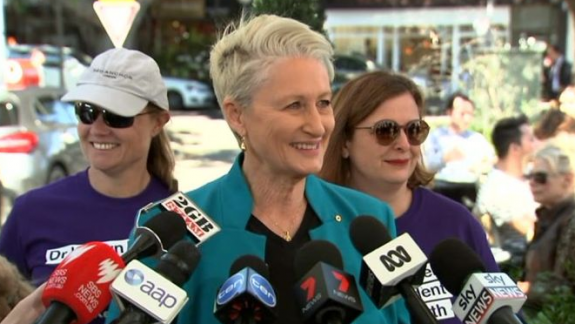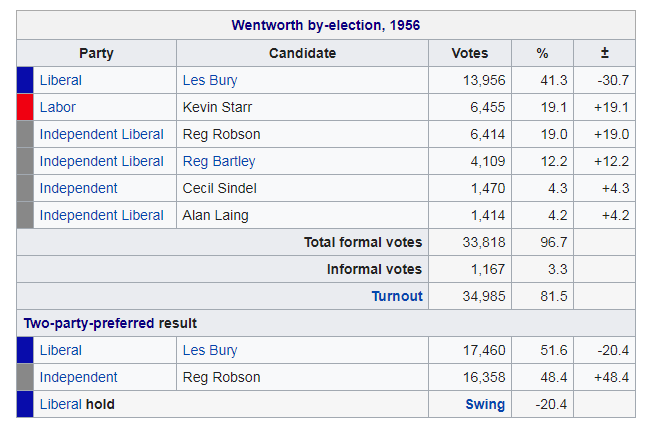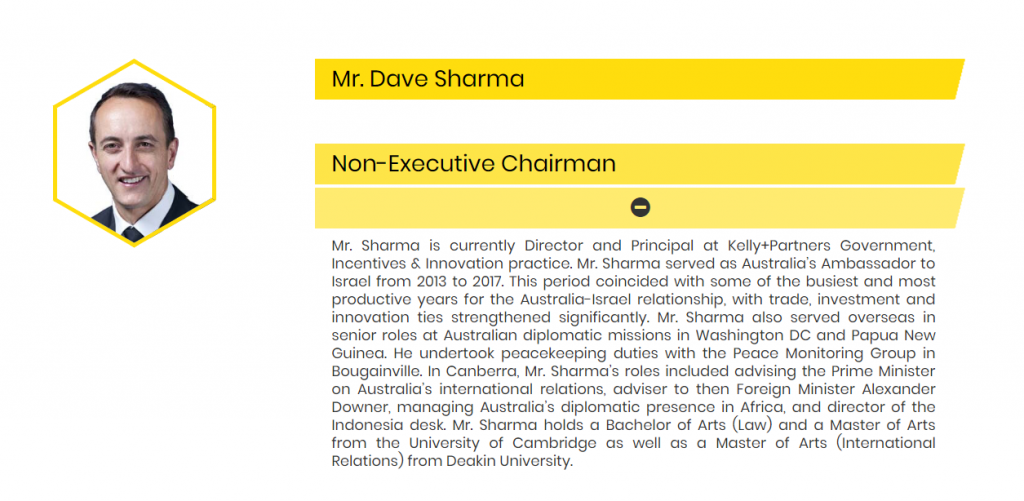Implications of Wentworth: Can Progressive Liberalism Triumph Across Australia?

By Denis Bright
As the days pass since the Wentworth by-election, a new level of resistance has emerged in the federal LNP on the best responses to the arrival of Dr Kerryn Phelps in Canberra. The blind-spots are evident in both the progressive and conservative wings of the LNP.
The federal LNP’s electoral successes in holding electoral jewels like Wentworth are the product of over seventy years of largely successful campaigning. As the Cold War intensified, the LNP mastered a shrill conservative populism which predated the excesses of Margaret Thatcher and Richard Nixon. The LNP had become an entrenched conservative party. It is stubbornly resistant to change despite the 18.8 per cent swing against the Coalition in Wentworth.
Commitment to market ideology and the US global military alliance are the cornerstones of Australian LNP politics as in the late 1940s.
In the closely contested national elections of 1954, Deputy Leader of the Parliamentary Liberal Party Sir Eric Harrison was not opposed in Wentworth. Sir Eric Harrison (1892-1974) represented Wentworth from 1931 to 1956. He was appointed High Commissioner in London (1956-64).
The by-election to replace Sir Eric Harrison on 8 December 1956 contained some of the elements of last weekend’s by-election. It produced an even stronger swing against the LNP.

Local leadership transitions for a long-standing representative can be sticky affairs for both sides of politics as shown by aberrant swings in Bass (1975), Oxley (1988), Wills (1992), Canberra (1995) and Ryan (2001).
Despite warnings from Prime Minister Morrison, the tidal wave of aberrant by-election results re-surfaced in Wentworth. Coping with the loss of Wentworth to Dr Kerryn Phelps has brought defensive explanations in door-stop interviews from LNP insiders:
Josh Frydenberg has played down the need for a significant shift in the Morrison government’s stance on climate change before the next federal election after the strong protest vote in the seat of Wentworth.
The treasurer and former energy and environment minister Josh Frydenberg told Sky News on Sunday people in Sydney’s eastern suburbs were concerned about climate change, but he said the government did not intend to “reduce emissions at the expense of people’s power bills.
Defence of the status quo continued in Prime Minister Morrison’s hard-line against the resettlement of refugees in New Zealand:
Scott Morrison has shot down an overture by Labor aimed at breaking the political deadlock over Nauru, declaring “you don’t horse-trade on border protection”.
Labor on Tuesday proposed three amendments to government legislation designed to close off re-entry to Australia for any asylum seekers resettled in New Zealand – legislation the opposition has previously rejected outright, and the shift was welcomed by several Senate crossbenchers.
Other high-profile figures, including the former human rights commissioner Gillian Triggs, have backed the bill as a pragmatic solution to get children and families off Nauru, and lower house crossbenchers have urged the Coalition and Labor to come to an agreement.
Initial signals during the Wentworth by-election campaign did suggest that Scott Morrison was charting a new policy direction for the LNP government. Scott Morrison offered bipartisan support to protect gender diversity in private schools and the passing on of reduced company tax to medium sized businesses.
The second last week of the Wentworth campaign brought a retreat to old time LNP values.
With an unguarded impromptu comment at a beach-side interview, Dave Sharma gave support to move the Australian embassy to Jerusalem. Prime Minister Morrison supported the casual aside. As the former Australian ambassador in Tel Aviv, Dave Sharma should have been aware of the negative consequences of this diversionary issue which would have divided Jewish opinion in Wentworth.
Dave Sharma’s connections to Israel extended far beyond his appointment as Australian Ambassador to Israel (2013-17) as part of an impressive career path within DFAT since 1999.
As the Non-executive Chair of Israeli technology firm Shekel Brainweigh Ltd, Dave Sharma’s corporate profile features prominently in biographies of its Board of Directors:

Some of the strategy confusions in the federal LNP extend to some of its other electoral jewels in metropolitan electorates.
In Brisbane’s electorate of Ryan, inclusive, but still conservative LNP member Jane Prentice, was by-passed in pre-selection in favour of BCC Councillor Julian Simmonds against the advice of former prime minister Malcolm Turnbull:
Malcolm Turnbull has admitted he went into bat for Jane Prentice at her recent preselection – urging her branch in Queensland to keep her as its representative – and was ignored.
The prime minister, who referred to the assistant social services minister as “a friend of mine”, said he believed he had done all he could to boost her chances of preselection for the seat of Ryan, but would not be intervening to insist she was reinstated.
Letting go with the past is difficult for LNP strategists as it means abandoning the fear strategies about fragility of market ideology and security threats to Australia which have been used so successfully since the 1940s.
In today’s circumstances, giving more autonomy to the National Party to work co-operatively with far-right parties in regional electorates, could perhaps co-exist with a more progressive interpretation of liberalism in comfortable metropolitan electorates like Wentworth. Independent cross-bencher, Cathy McGowan has ruled out supporting this possibility through the return of Barnaby Joyce as National Party leader (AFR 22 October 2018).
Meanwhile back in Wentworth, there was no outbreak of class politics against unaffordable housing prices and falling real wages at the Wentworth by-election. The property market in Bondi Junction is going through a correction but housing affordability is still geared to the big end of town.


Images from realestate.com.au
In Bondi Junction, Dr Kerryn Phelps gained 31.64 per cent of the primary vote. The LNP vote had plummeted from 56.32 per cent in 2016 to 38.5 per cent in the current by-election. Endorsement of a new style of progressive liberalism emerged as the real winner.
At the boutique Vaucluse polling booth with its 527 voters, the LNP’s primary vote dipped from 96.3 per cent in 2016 to 63.4 per cent. Only 19.8 per cent of voters went with Dr Kerryn Phelps.
 Others perhaps thought about the prospects of cashing in on the property market before the current correction gains momentum. Gaining Dr Kerryn Phelps as the local federal MP for Vaucluse was surely a curious political miracle as life went on as usual in the leafiest exclusive lanes of Australian society.
Others perhaps thought about the prospects of cashing in on the property market before the current correction gains momentum. Gaining Dr Kerryn Phelps as the local federal MP for Vaucluse was surely a curious political miracle as life went on as usual in the leafiest exclusive lanes of Australian society.
Future generations will surely look back on the Wentworth by-election as a real game changer in Australian political history. The LNP has been pushed by voters themselves to embrace a more progressive version of liberalism but its leaders simply will not take the plunge to break with 76 years of ideological successes since Robert Menzies espoused the case of The Forgotten People in 1942 (ABC News Online 22 May 2017).
Dr Kerryn Phelps is one of Sydney’s ethical success stories. Her leadership is quite independent of changing political fortunes. Fortunately, she has decided to work towards democratic renewal as the political compasses of the Prime Minister’s frontbench are more firmly fixed on the old charts to future electoral successes.
 Denis Bright is a registered teacher and a member of the Media, Entertainment and Arts Alliance (MEAA). Denis has recent postgraduate qualifications in journalism, public policy and international relations. He is interested in advancing pragmatic public policies that are compatible with contemporary globalisation.
Denis Bright is a registered teacher and a member of the Media, Entertainment and Arts Alliance (MEAA). Denis has recent postgraduate qualifications in journalism, public policy and international relations. He is interested in advancing pragmatic public policies that are compatible with contemporary globalisation.









30 comments
Login here Register here-
blair
-
Stephen Fitzgerald
-
SteveFitz
-
Stella
-
Ross
-
paul walter
-
paul walter
-
Mia
-
paul walter
-
Matters Not
-
Paul
-
Leila
-
Chris
-
James Robo
-
Tessa_M
-
For An Alternative Australia
-
Denis Bright in Brisbane
-
Stephen Fitzgerald
-
Diannaart
-
Denis Bright in Brisbane
-
Stephen Fitzgerald
-
Stephen Fitzgerald
-
Denis Bright in Brisbane
-
paul walter
-
Stephen Fitzgerald
-
Denis Bright in Brisbane
-
SteveFitz
-
Denis Bright in Brisbane
-
SteveFitz
-
SteveFitz
Return to home pageMalCayman was a “progressive Liberal” & look what happened to him?
Dr Kerryn Phelps in canberra will definately pull the LNP across to the progresive centre. They have no choice. So, good observation Denis. One problem! By nature, you can’t be a progressive and a Liberal. For Kerryn Phelps, the way she played her cards was the way in the door. Smart girl and I’m sure she will delivers.
Point [2] Reducing emissions at the expence of peoples power bills is a smoke screen, to coin a phrase. It’s always been about reducing emissions at the expense of coal producers. Scott Morrison was not sitting in parliament with an electricity bill in his hand. He was sitting in parliament fondling a piece of coal
Australia’s greenhouse gas emissions climb again, amid climate policy vacuum
https://www.theguardian.com/environment/2018/sep/28/australias-greenhouse-gas-emissions-climb-again-amid-climate-policy-vacuum
Point [3] High-profile figures, including the former human rights commissioner Gillian Triggs have pressured the LNP about human rights abuse. Now, here’s another question Denis. Why are the LNP opposed to human rights protection being written into Australian Law? I’ll give you my take on it… Every aspect of corporate corruption has an element of human rights abuse woven into it. With human rights legislation and, a human rights court accessible to all Australians we, the people, can tackle corporates head on and, the government don’t need to become involved.
Unacceptable’: UN committee damns Australia’s record on human rights
https://www.theguardian.com/australia-news/2017/oct/19/unacceptable-un-committee-damns-australias-record-on-human-rights
Point [4]: Settled refugees in NZ should have the same rights as any New Zealander – Full stop. The only issues with that, come from the LNP – No one else… Not the people, not Labour, not NZ, not the UN, just the LNP.
One last point Denis – Who do you see as the big winners from contemporary globalisation? To me at least, it looks like big business and corporations once again. The rest of the West are struggling to compete with off shore wage rates of $1.00 per hour. Goodbye manufacturing and usher in unemployment and poverty for millions, was the outcome in the west. You may have a more enlightened view – If so, lets hear it.
Denis, thanks very much for an interesting coverage of the Wentworth by election.
hmmmm, so Sharma’s name pops up as an advisor Alexander Downer, no wonder he was pre selected
That is true, re Sharma and Downer?
How is it these things always come out AFTER an election instead of during when the people need to know such things?
blair , the only thing “progressive” about Mal has been the the rapid increase in his numbered accounts over the years.
The significance of the result in Wentworth is becoming clearer as the days pass.
Lessons from this result are relevant to both sides of politics.
It has been covered up very quickly, like a dirty secret or skidmarks on underwear.
Such indecent haste indicates a whiff of panic. This was not supposed to happen.
Almost like an assembled family furtively trying to cover up on a nasty abomination from the past in an Agatha Christie yarn
paul walter – you may want to check out Sharma’s connection to Bob Carr as well.
https://foreignminister.gov.au/releases/2013/bc_mr_130516.html
No doubt he was well qualified for the job in Israel. Besides he’s an insider with all the connections (like Downer’s daughter) – at least as far as Foreign Affairs is concerned.
Thanks for the awesome article Denis!
Interesting insights from the weekend just gone!
It’s time to head to the strategy room LNP.
Could not agree more.
We need a Federal Election now, not next May.
The conservatives are in disarray, and need to go back , decide on their policies& present a united front to the Australian people so they can form an effective Oppostion
Well researched coverage of the consequences of the LNP’s first loss in Wentworth since 1901.
Rejecting the refugee offer from New Zealand to end the suffering of the refugee is a callous decision. Thanks for remembering them in your article.
Australia needs leaders like Jacinda Ardern who are identified with policy flexibility.
Fully agree, Matters Not, the LNP moves with the Big End of Town: Australia should want a different direction! Monday’s Newspoll suggest that this is happening with the LNP behind in every state.
Thanks for the comments from Stephen FitzGerald. I don’t know Stephen personally but he may be Gough Whitlam’s accredited ambassador to China (1973-76) and to the DPRK in 1975. What a trail Dr FitzGerald blazed to enhance Australian diplomacy for development and peace. Perhaps Australia moved up a notch towards greater independence in international relations through Dr FitzGerald’s personal efforts on our behalf.
Deconstructing the future of the short recent phase of globalization since the end of the Old Cold War in 1989 is an ongoing art which Dr Fitzgerald has pushed to a higher level with his articles on the TPP for AIM Network.
30 years is a short time in the history of humankind. What is going to happen to the Indo Pacific by even 2050 in this volatile global economy is uncertain.
I know that my superannuation balance is down by several thousand this month due to global market volatility. As I comment, I see that Wall Street will close on another correction of -1.47 per cent which will probably play out in superannuation balances next week (https://finance.yahoo.com/quote/%5EDJI/).
There are short, medium and long-term winners in financial globalization. I look to the McKinsey Global Institute for advice on the immediate trends (https://www.mckinsey.com/mgi/our-research).
My best efforts went into deconstructing the trends covering topics like the APEC Summit in Port Moresby coming up next month and some of my earlier articles on Australian foreign policy 2050 or the USA as the Haven of Trump’s Populism (https://theaimn.com/faraway-places-usa-a-collective-raising-of-the-modernist-banner-at-home-and-abroad/#comments).
To protect Australians in all this volatility, we need less timid leaders in the Whitlamite tradition. The current winners of financial globalization may not be the grinners in 2050 and beyond. The politics of fear is a real barrier. Our foreign policies are far too bipartisan in ignoring the excesses of the Trump Era.
President Trump is taking the US back to an America First style of gun-boat diplomacy which was promoted by character like President Monroe and John Quincy Adams as Secretary of State almost two centuries ago. Following this non-sense is a threat to our national security.
I do hope that Dr Kerryn Phelps will speak up against these terrible excesses as Member for Wentworth and become more Whitlamesque in her orientation.
Denis, it’s O.K. to observe contemporary globalisation and have an impartial view. That’s what I have always tried to do. There is an upside and a downside but, what has always concerned me is motive and, that’s where I dig around.
If you wish to bring diplomacy and humanitarian issues into the debate then yes, I am more than happy with the association to Dr FitzGerald. Clearly, he was the better diplomat. What we really need to do though, is look at the bigger picture in terms of globalisation.
What it actually boils down to is “Americanisation” which in effect is “Corporatisation” of the globe. There are plenty of examples of “Rule the World” down through the ages. Most by sheer force, brutality and atrocity and, others covertly.
Back to being a humanitarian. Some countries don’t want to be Americanised. You can destabilise them, you can bribe them, you can destroy their society, you can war with them, you can kill their women and children, you can create a refugee crisis, you can sanction them, you can install a puppet government and, they will still resist. The devastation we see in Muslim countries is a result of resistance to the American form of globalisation.
There is compelling evidence to suggest that right wing governments are like a fire wall to protect corporate interest. It follows that a global government would be no different. Put in place and manipulated so that corporates can rule the world. On a smaller scale, we seem to be resisting that same scenario in Australia right now.
Well said, Denis.
I share your concerns of all you have written.
Should Dr Phelps prove to be Whitlamesque (which would be sensational) without support, little will change to steer us away from a feudalistic world brought on by environmental ravages, resultant food and water shortage and the inevitable collapse of the stock market. No doubt many financiers would leap from buildings as Mammon refuses to listen to their prayers. Boo bloody hoo.
Maybe, like the “recession we had to have”, this is our merited apocalypse.
Earth will endure, life (not necessarily as we know it) will continue. Whether my friends, family and other animals will prevail is uncertain.
Will sufficient numbers of humans remain to continue the primate lineage? Perhaps, but will we have learned?
No problems here with your interpretation, Stephen. The apparent diversity of voices can be a ruse to firewall association with corporate interests.
However, if some representatives have a grand reputation and ethical commitment, then they are more likely to be upfront about their associations with corporate power. I welcome Dr Kerryn Phelps as a better representative for Wentworth.
Corporate power also extends to silencing Labour Parties as with Tony Blair’s support for the wars across the Middle East and the toppling of Libya’s Government in the name of freedom and democracy.
Corporate power is legitimised by its apologists and compared by its apologists to the finances of a humble family household or corner store.
The now deceased Peter Gowan (1946-2009) portrayed the excesses of market power in international relations from his position at London Metropolitan University. Regrettably, some other academics talk up the value of militarisation in defence of global military industrial complexes.
https://newleftreview.org/II/55/peter-gowan-crisis-in-the-heartland
So it is important to welcome updates of the Peter Gowan article in the post-GFC era. Although the McKinsey Global Institute is pro-business, it still covers topics in an even-handed way. But where are the academics who dare to go further?
Denis, we thank those academic who look outside the loop. We need to keep in mind that we can’t have a situation where corporates control us, and dictate what they want, in a corrupted version of democracy. That applies locally and globally and, being aware of corporate intent puts us in a better management position.
The GFC, global being the operative word, had far reaching impact because of globalisation. Previously, the corporate rape, pillage and plunder of their own society would have been contained domestically, within America.
A compelling argument for the pressing need to legislate regulations and control corporates. Also, a compelling argument to dismantle corporate and political coalitions.
Denis – As we have already established, I’m not the diplomat. I jumped because of your interest in “advancing pragmatic public policies that are compatible with contemporary globalisation”. Not all plurals need an “s” sprung to mind.
Thanks Stephen for your clarification: I am a big fan of the other Dr. Stephen FitzGerald and of course Dr Kerryn Phelps who motivated my article in the first place. Being out all day, I may have missed one of your points.
God help us if we get a replay of the US presidential election of 2016.
We see what the future holds and really wonder what is in store.
Thanks Denis, we do have some things in common. It’s not about who or what we like or don’t like, it’s about the facts. I try to point those things out to present a more balanced uncensored view. When we look at the broader picture, we are in a much better position to guide our destiny.
Thanks, Stephen Fitz, do comment on my next articles.
Critical structuralism will ultimately produce another Progressive Australian Settlement as attempted by Fisher, Curtin, Chifley and Whitlam It might not come in my lifetime.
If Deakin and Fisher could achieve an Australian Settlement before 1914, with all its limitations, there is hope for the future. Unfortunately, Fisher retained blind-spots about over-commitment to the British Empire which was unable to protect Australia is 1942. Just imagine the consequences if John Curtin had left the AIF in North Africa or diverted them to Burma as Churchill had requested.
In the shorter-term to mid-century, the quest for a greater global influence by the federal LNP is our greatest security threat as covered by my three-part scenarios about 15 months ago:
My two-part article on relations with Indonesia from almost two years ago is still relevant:
https://theaimn.com/indonesia-beyond-news-filters-part-1-2/#comments
Most ONA documents, even from the late 1970s, are still under raps. Contemporary historians still have a difficult challenge in writing a critical Australian history of our times.
In the traditions of the current ABC soapie on Pine Gap, commentators can always try fiction to unlock the present and to challenge our blind-spots which are concealed from public debate or distorted by a prominent national newspaper.
Thanks Denis – I will certainly have a close look tonight… Corporate and political coalitions are invariably umbrellaed by monopolised media for mutual benefit. It’s all about money, power and control, driven by greed, and flies in the face of democracy – I’ll get back to you.
Sorry about the typo “raps” instead of “underwraps”. Thanks for not scolding me! I realized the mistake but it was too late to change the comment.
Yeah, I know what you mean – I throw typos around with gay abandon.
https://theaimn.com/indonesia-beyond-news-filters-part-1-2/#comments
Our relationship with Indonesia has always been a little tenuous. Australia’s $316 million foreign aid package to Indonesia strikes me as being a bit like the little kid at school giving the big kid his lunch money to buy impunity. Australia’s involvement in the South China sea is a bit the same. Personally, I don’t think we should be there. There is no strategic benefit for us and globally it just makes us look like we are trying to big-note ourselves.
Indonesia has always hovered very closely to being a military dictatorship with all the trimmings. Including being expansionary. When Kakuei Tanaka did a visit through south east Asia, students in Indonesia protested and rioted. This spread to the Muslim population who became involved in destroying anything resembling entertainment. I watched Jakarta burn and bodies pile up on the street as the military took control with brutal force. Not a word was ever said in the Australian press. That was 69/70 and it shows the Indonesians exist on a hair trigger.
Buying favour with Indonesia only counts as long as they decide it counts. There’s an old saying – Keep your friends close and potential future unknowns even closer. I think we sleep easier knowing that America is our big brother ally and, as long as we have an abundant stock of natural resources, we are willingly to top up their strategic armaments and accommodate their military bases, they will keep an eye out for us.
In terms of the future scenario – I’ll give it another read and see.